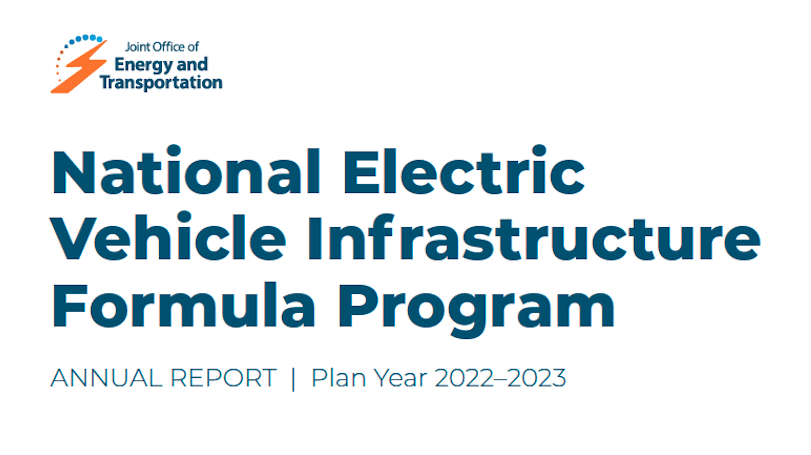Joint Office Releases NEVI Formula Program Annual Report
July 11, 2023

The Joint Office of Energy and Transportation (Joint Office) released the National Electric Vehicle Infrastructure (NEVI) Formula Program Annual Report, Plan Year 2022–2023.
The NEVI Formula Program provides nearly $5 billion over five years to help states, Washington, D.C., and Puerto Rico create a network of electric vehicle (EV) fast charging stations along designated Alternative Fuel Corridors (AFCs), with emphasis along the Interstate Highway System.
This report summarizes the key activities of the Joint Office in relation to the NEVI Formula Program and provides an individual and collective overview of the first-year deployment plans. The Joint Office will use the summary of these plans to support states as they implement their EV charging infrastructure—a process that was furthered with the announcement that the first NEVI-funded charging contract was awarded to support electrification in Hawaii.
Key Findings from FY 2022 and FY 2023 State Plans
-
All state plans were submitted by August 1, 2022, and approved by September 27, 2022—a tremendous accomplishment by all NEVI participants and a strong indicator of the importance of and interest in the NEVI program. A total of $1.5 billion for fiscal year (FY) 2022 and FY 2023 will be released to support implementation of those plans.
-
All NEVI deployment strategies include designated portions of the National Highway Systems as AFCs—roughly 75,000 miles in total—and prioritize build-out along the Interstate Highway System.
-
Many states anticipate they will achieve build-out of their AFCs in future years with funding remaining for additional capacity or deploying stations in compliance with the NEVI Formula Program in non-AFC locations. The Joint Office estimates up to $3.5 billion of the $5 billion could remain after build-out.
-
General areas of plans that could be enhanced include procurement strategies, proposed station siting, cybersecurity, program evaluation, and meaningful community engagement and Justice40 implementation. These topics will be emphasized in technical assistance provided by the Joint Office.
-
To allow implementation flexibility by state, a total of 56 exception requests (to requirements for station spacing along highways or station locations from highways) were submitted; 18 were withdrawn after review determined they were not needed, 29 were approved, and 9 were denied.
Joint Office Technical Assistance for EV Infrastructure Stakeholders
The Joint Office provides technical assistance for the planning and implementation of a national network of EV chargers and zero-emission fueling infrastructure, as well as zero-emission transit and school buses. For technical assistance, contact the Joint Office.
